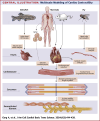Assessing Cardiac Contractility From Single Molecules to Whole Hearts
- PMID: 38559627
- PMCID: PMC10978360
- DOI: 10.1016/j.jacbts.2023.07.013
Assessing Cardiac Contractility From Single Molecules to Whole Hearts
Abstract
Fundamentally, the heart needs to generate sufficient force and power output to dynamically meet the needs of the body. Cardiomyocytes contain specialized structures referred to as sarcomeres that power and regulate contraction. Disruption of sarcomeric function or regulation impairs contractility and leads to cardiomyopathies and heart failure. Basic, translational, and clinical studies have adapted numerous methods to assess cardiac contraction in a variety of pathophysiological contexts. These tools measure aspects of cardiac contraction at different scales ranging from single molecules to whole organisms. Moreover, these studies have revealed new pathogenic mechanisms of heart disease leading to the development of novel therapies targeting contractility. In this review, the authors explore the breadth of tools available for studying cardiac contractile function across scales, discuss their strengths and limitations, highlight new insights into cardiac physiology and pathophysiology, and describe how these insights can be harnessed for therapeutic candidate development and translational.
Keywords: contractility; myocyte; myofibril; optical methods; optical tweezers; traction force.
© 2024 The Authors.
Conflict of interest statement
This work was supported by the National Institutes of Health (grants R01 HL141086 to Dr Greenberg, R01 HL161185 to Dr Lavine, R35 HL161185 to Dr Lavine, and T32 HL007081 to Dr Garg), the Leducq Foundation Network (grant 20CVD02 to Dr Lavine), the Burroughs Welcome Fund (grant 1014782 to Dr Lavine), the American Heart Association (grant 970198 to Drs Greenberg and Lavine), and the Children’s Discovery Institute of Washington University and St. Louis Children’s Hospital (grant PM-LI-2019-829 to Drs Lavine and Greenberg). Dr Lavine is the recipient of sponsored research agreements from Amgen, Novartis, Kiniksa, and Implicit Bioscience; and provides consultant services to Medtronic, Kiniksa, and Implicit Biosciences. All other authors have reported that they have no relationships relevant to the contents of this paper to disclose.
Figures













References
-
- Heidenreich P.A., Bozkurt B., Aguilar D., et al. 2022 AHA/ACC/HFSA guideline for the management of heart failure: a report of the American College of Cardiology/American Heart Association Joint Committee on Clinical Practice Guidelines. J Am Coll Cardiol. 2022;79(17):e263–e421. - PubMed
Publication types
Grants and funding
LinkOut - more resources
Full Text Sources

